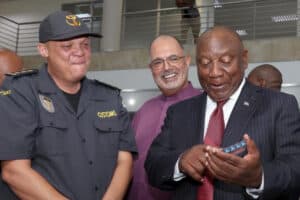A desperately divided ruling party is scrambling to find compromise and unity ahead of elections.

Following several provincial general councils this week, the ANC is looking at different ways to foster unity ahead of party elections this year and general elections in 2019.
The party is split down the middle with support for either Nkosazana Dlamini-Zuma to be the next president or current deputy president Cyril Ramaphosa.
City Press reports that the party is considering the addition of another deputy president position to its top leadership and an additional two deputy secretary-general positions, which could take the leadership core to eight or even nine members.
Chairpersons and provincial secretaries have been horse-trading all week in preparation for this weekend’s national policy conference.
ANC Gauteng chairperson Paul Mashatile, who has been tipped to ascend to national leadership, confirmed there is a general consensus to make the central leadership group larger and find a solution to having both Dlamini-Zuma and Ramaphosa play a top role of some sort.
It is unlikely that either of the frontrunners are likely to compromise, however, as Ramaphosa made it clear this weekend in a Sunday Times interview that he did not think the call for a female president was relevant.
“South Africa does not need a woman president right now. It needs a capable, uncaptured leader to restore the hope and work with the entire nation to restore the spirit and commitment and obligation the party has not the for the African National Congress but the nation.”
He added that it was clear the country was “unravelling” in the face of evidence of state capture and reiterated his call for a judicial investigation into the allegations, which also implicate President Jacob Zuma.
Ramaphosa also underlined his belief that the National Development Plan is not dead and can still be the “lodestar to lead us forward”. He rejected with contempt any suggestion that he was somehow the tool of “white monopoly capital”. He said the slur was part of a strategy to “ensnare you into the mud and exhaust you with these sorts of insults”.
The Sunday Times also reported that a Top 9 was likely regardless of factions and compared with policy preferences that separate the two top candidates.
Unlike Ramaphosa, Dlamini-Zuma is likely to push for land expropriation without compensation. She will also be far more aggressive in overhauling economic policies and pushing for “radical transformation”, while supporting a takeover of banks and mines.
She also appears to support the notion that “white monopoly capital” has historically long captured the state.
Support Local Journalism
Add The Citizen as a Preferred Source on Google and follow us on Google News to see more of our trusted reporting in Google News and Top Stories.








